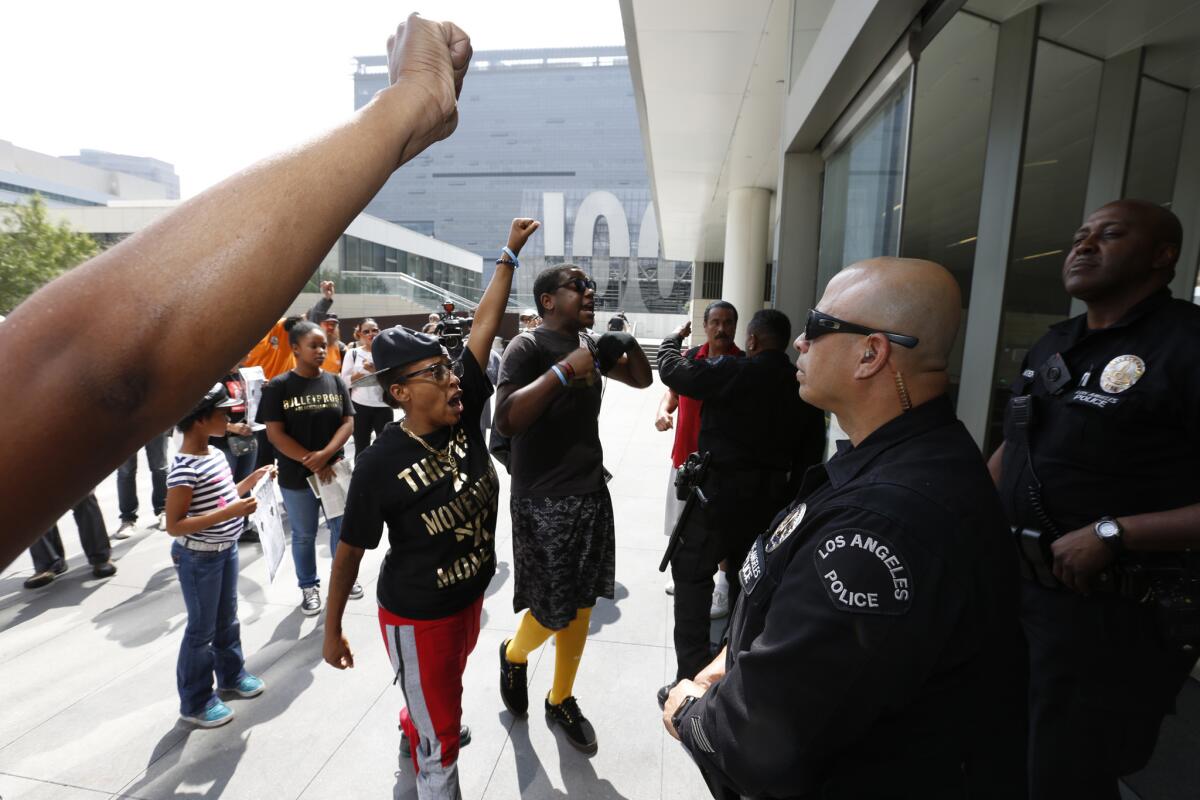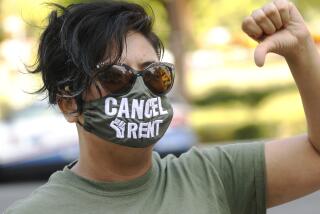L.A. Police Commission drops proposed civility rule for meetings

Protesters shout their message in the face of an LAPD officers after disrupting the Los Angeles Police Commission meeting in August 2015 on the one-year anniversary of Ezell Ford’s death.
The Los Angeles Police Commission has dropped a controversial proposal to require people attending its public meetings to show courtesy and civility or risk being removed.
Commissioners will consider a revised set of rules on Tuesday, two weeks after an initial proposal drew criticism from activists and the American Civil Liberties Union for warning meeting attendees against making “repetitious, personal, impertinent or profane remarks.”
The initial set of rules, put on the board’s Sept. 1 agenda, came after a series of meetings were disrupted by activists, including those affiliated with Black Lives Matter, protesting recent police shootings.
The first document put before the commission said the rules were designed to “establish an appropriate level of safety, decorum and efficiency” during the weekly meetings.
Some of the proposed guidelines formally outlined existing practices -- for example, that audience members must pass through a metal detector and submit speaker cards before addressing the board. Others, however, stipulated that attendees were “expected to behave in a civil manner at all times.”
The initial recommendations drew fire from the activists who regularly attend the meetings and from the ACLU’s local chapter. An ACLU staff attorney sent a letter to the board citing several cases protecting free speech, saying the commission could not mandate that speakers be “courteous, respectful, polite.”
Citing the letter, the board’s executive director withdrew the proposal from the board’s Sept. 1 agenda until it could be further reviewed by the city attorney’s office.
In a letter to commissioners made public Friday, Executive Director Richard Tefank said “modifications have been made to clarify the intent of the rules is not to inhibit free speech, but rather allow the meetings to function in an orderly and efficient manner.”
The new proposal outlines many of the same logistics for those attending the meetings -- speakers, for example, must address the board from a podium and keep their comments within the allocated time. Attendees who don’t follow the rules can still be warned and later ordered to leave the meeting. If they don’t, they could be removed by police.
Steve Soboroff, the president of the Police Commission, said the board would take a close look at the second set of rules and make any further modifications necessary.
“There were things in the first draft that could have been misinterpreted that now just aren’t even in there,” Soboroff said. “Now it’s clear that our goal is not to impede any of those rights to free speech. ... Our goal is to be able to conduct the meeting in the first place.”
Hector Villagra, the executive director of the ACLU’s Southern California chapter, said his group was glad to see the commission had taken its concerns seriously.
“It is particularly important at this moment to be scrupulous about permitting the public to provide its input to the fullest extent possible, given the attention that is properly focused nationally and locally on policing practices,” he said.
“Of course,” he continued, “these rules must be still enforced in a way that allows for strong speech and criticism, and prevents only actual disruptions of the proceedings.”
Follow @katemather for more LAPD news.
More to Read
Sign up for Essential California
The most important California stories and recommendations in your inbox every morning.
You may occasionally receive promotional content from the Los Angeles Times.










